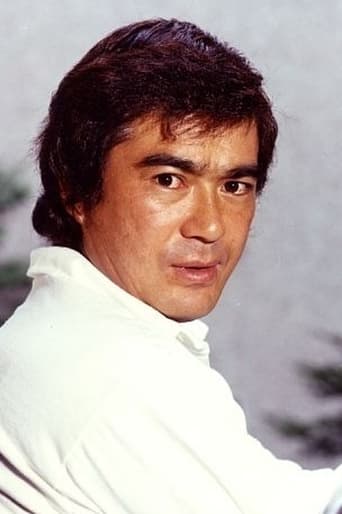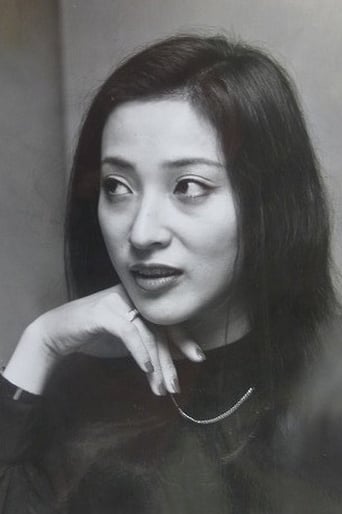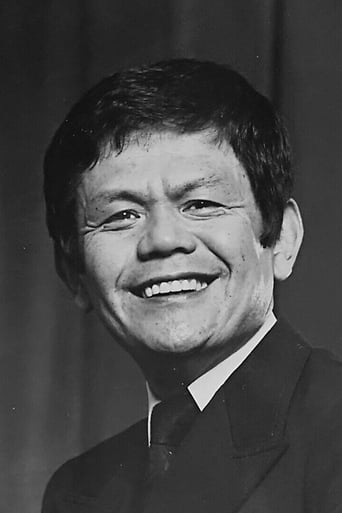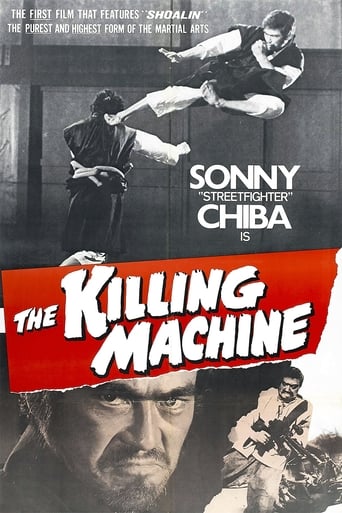
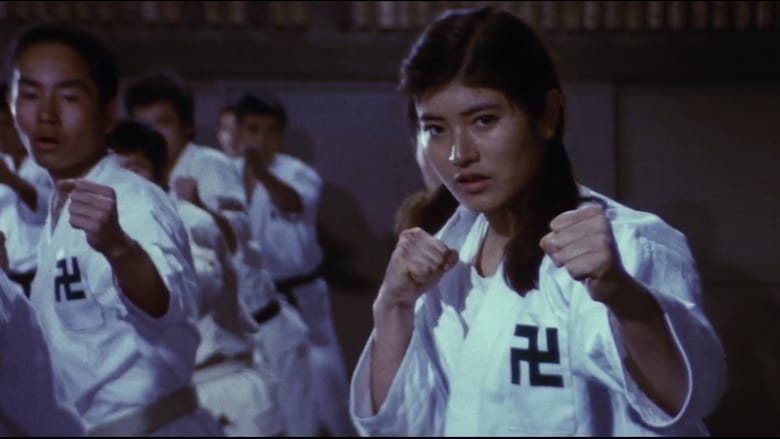
The Killing Machine (1976)
Mr. Soh, a righteous man with a cold stare and fists of steel, returns to a lawless post-war Japan in 1946. He protects the weak, defends the poor and knocks some good sense into friends and enemies alike. Rapists and gangsters get the worst of it, as Mr. Soh builds up his school on the island of Shikoku.
Watch Trailer
Cast


Reviews
Powerful
Just perfect...
Good films always raise compelling questions, whether the format is fiction or documentary fact.
There is, somehow, an interesting story here, as well as some good acting. There are also some good scenes
Sonny Chiba's masterpiece? Inspired by the life of an actual person. Sonny's movies are often disparaged by serious martial arts fans for having camera work that obscures the technique of the martial artists during fight scenes, but most agree this one strikes the right balance. For myself, I think the Japanese directors of this period are always aspiring to a higher level of artistic expression than their Hong Kong equivalents (perhaps due to the recognition accorded to Akira Kurosawa?) but often their ambition outstrips their talent. However not in this case. Being a period piece (post WW2) we are spared (or deprived, depending on your point of view) the usual quirky Japanese fashion statements, which have seen Sonny kicking ass in an assortment of outrageous hats, goggles, puffy shirts and fishnets in other movies. The film is set mainly in Japan during the period of American occupation after WW2, so for the non-Japanese viewer, the main obstacle to enjoying this movie is trying to relate to the concept of feeling any sympathy for the Japanese people's suffering, in light of the many heinous atrocities they committed during the war. Sonny begins the movie as a secret agent, kicking the ass of dirty Chinese guerrilla fighters, who are misguided enough to resist the heroic Japanese army of occupation, I mean liberation. Later, on a train journey, he kicks the ass of some despicable Korean carpetbaggers, who are gleefully lording it over their former oppressors, I mean emancipators. Then he brings swift and painful retribution to a couple of arrogant American soldiers in a jeep, who are driving around in a reckless fashion and inadvertently run down a hapless Japanese child. However Sonny is at pains to point out, to a local official in a later interview, that he also told off Japanese officers and soldiers when he saw them mistreat the Chinese (but stopped short of actually kicking their asses it seems). So for the foreign viewer it may be easier to enjoy the movie as form of dystopian science fiction film, where a conquered people, shocked and disoriented, their society completely dislocated, struggle to come to terms with their fall from grace. Putting aside the right and wrong of the war itself, where some may suggest, the Japanese deservedly reap what they sowed, the suffering on a human level is universal. A young woman who has been raped by the bestial Russians, is driven to try and become a prostitute in order to feed herself and her younger brother, until Sonny recues her from the harassment resentful regulars. A despairing drunken man, who has been searching for his wife among the displaced, eventually finds her and his son, only to learn that she has remarried, thinking he was dead, so he walks away rather than make her life more complicated. A man who has lost his will to live after having his arm chopped off regains his self respect after being given a good slapping by Sonny and told to harden up. This film contains considerable raw emotional depth! Mad Max-like, Sonny wanders through this wasteland of shanty towns and subways tunnels, dominated by Black marketeers and proto Yakuza, taking care of lost children and dispensing random vigilante justice. Eventually he realises he can't redeem the Japanese National spirit alone and begins preaching his message of salvation and rebirth through martial arts to any who will join him. Along the way he also kicks plenty of corrupt Black market and Yakuza ass, including what, for many, is the ultimate Sonny Chiba moment, where he cuts off a rapist gangster's privates with a pair of scissors!! Then he turns to the audience and hefts them in his palm appraisingly, before tossing them onto the floor, where upon a dog trots in from stage right and sniffs at them before happily wolfing them down!!!
My rating of 8 is strictly for the English dubbed version of this Sonny Chiba film. That's because like many martial arts films dubbed in the 1970s and 80s, the dubbing was very poor--with words like "kempo" mistranslated as "shao lin" and the title of the movie being "The Killing Machine"--a concept in direct opposition to the teachings of Doshin So (and about whom this movie is based). With subtitles, it probably rates a 9.Considering that Sonny Chiba's films about Masutatsu Oyama were great (though not exactly literal) martial arts biographies, I made it a point to see his film about Doshin So--the founder of another style of martial arts (both in which, by the way, Chiba earned black belts). And, like these other films, this one is very exciting and features exceptional martial arts techniques. In fact, as the philosophies of the two masters were similar in some ways and they lived during the same period, the films have many, many similarities--especially the main character's reliance on justice for "the little guy". However, unlike the Oyama character, So seemed a bit more purposeful in his life--not wandering about during many of the post-war years looking for trouble. In fact, considering that much of THE KILLING MACHINE was spent beating up mobsters, the film is almost like the merging of the Oyama films with the Zatoichi films (where master Ichi enters a town full of Yakuza and leaves after having killed them all because of their abuse of the common people).About the only trouble with this film is its high level of violence. It was about on par with Chiba's Street Fighter films (which received X ratings for violence when they were released in the US in the 70s). Compared to modern films, the scenes aren't that bad and fortunately the rape scene was cut short before it became too brutal to watch. But, when the rapists then have their "nether-regions" cut off by So with a pair of scissors, it's a bit tough to see--especially with all the blood and watching a dog pick up the penis and run away with it! These punks DID have it coming, but this is certainly NOT a film for kids!!Overall, it's yet another fantastic martial arts film for Sonny Chiba--an amazing martial artist who probably comes the closest to the legendary Bruce Lee in style. His martial artistry is less elegant but far more brutal than modern actors like Jackie Chan and Jet Li. These newcomers are great fun to watch, but Chiba's characters are just concerned with killing blows instead of style--yikes! FYI--One reviewer seemed to feel that this film was overly sympathetic to the Japanese and their role in starting WWII. While I agree that the Japanese film industry has largely ignored their country's responsibility in the war, I don't think this film is trying to paint the Japanese as victims. Yes, some of the fight scenes involve Chiba fighting against American G.I.s, but he also fights with many Japanese Yakuza AND stops Japanese soldiers from raping a woman when the film begins. Additionally, the average poor Japanese citizen did feel rather disenfranchised and lost after the war because their way of life ended so abruptly.Also FYI--Throughout the film, So and his followers wear a dobok (a martial arts uniform) with a swastika on them. This is an ancient Asian symbol commonly used in India, China and Japan (among other places). It denotes luck or well being and is NOT an endorsement of Nazis--so relax and just enjoy the film!!!!
I won't lie to you. This movie does not contain any great philosophical ideas, ethical didacticisms or original story concepts. But what would be the fun in that? This movie is essentially all about Sonny Chiba rockin' the proverbial mic. The story is roughly this; a dude gets into too many fights, relocates, makes friends by getting into more fights, gets his friends injured in fights (notably arm severage), gets into fights to avenge said friends, is overtly ethical but then kicks some ass, gets in more fights, cuts off a rapist's wienie (then gives it to a dog to eat), learns about love and redemption (care of a token pure-and-innocent-girl-turned-victimised-hooker and a bunch of raggedy ass orphans) but knocks the shiz out of each and every fcuker that comes along and pisses him off nonetheless (especially if they're Chinese or American).Chiba's character, though loosely based on real life Shaolin badass Doshin So, is a little too close to many of Bruce Lee's characters from five years earlier (the overt morality and incorruptibility), but his presence (mean, badass, take-no-sh*t and strongly Nationalistic) and fighting style (Shaolin boxing) are both sufficiently different for that not to matter. Moreover, it's a departure from Chiba's usual character type, notably from the 'Streetfighter' series, where he is more or less completely amoral. This is a Sonny Chiba movie you could watch with your kids... were it not for the brutal violence.If you are looking for a Sonny Chiba film to serve as an introduction to his work, you could do a lot worse. Along with the original 'Streetfighter', 'Killing Machine' is one of his very best.
In one scene he helps orphans, the next he rips off someones penis and feeds it to a dog. He cries the loss of his love, the prostitute he helped get off the street...then his friend gets his arm cut off with a sword and blood spurts from the stump. All of this with Japanese Nationalist beliefs and hatred against Chinese & Americans. This does star Sonny Chiba and it isn't bad, though the drama seems a little cheesy with the orphans and everybody's fake tears. Not one of his top three films for sure.


